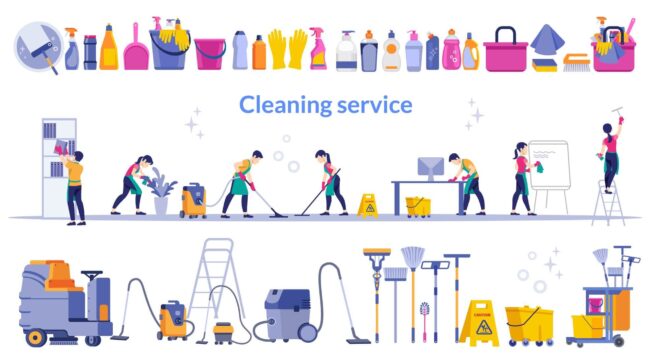![]()
Introduction
The cleaning industry in India has witnessed significant growth due to urbanization, increasing hygiene awareness, and rising demand from residential and commercial sectors. Starting a commercial and residential cleaning business offers a profitable opportunity with relatively low initial investment compared to other industries. However, establishing a professional cleaning business requires strategic planning, regulatory compliance, and effective marketing.
Definition of a Commercial and Residential Cleaning Business
A commercial and residential cleaning business provides cleaning services to homes, offices, industries, hospitals, malls, hotels, and other spaces. These services include deep cleaning, sanitation, maintenance, and specialized cleaning tasks such as carpet or window cleaning.
Types of Cleaning Services:
- Residential Cleaning: Includes home cleaning, deep cleaning, kitchen and bathroom cleaning, and floor polishing.
- Commercial Cleaning: Office cleaning, industrial cleaning, hospital sanitation, hotel cleaning, and warehouse maintenance.
- Specialized Cleaning: Carpet cleaning, pest control, disinfection services, and upholstery cleaning.
Requirements to Start a Cleaning Business in India
To establish an industry-level cleaning business in India, the following key requirements must be fulfilled:
1. Business Registration and Licensing
- Register the Business: Choose a business structure (Sole Proprietorship, Partnership, Private Limited Company, or LLP) and register it under the Ministry of Corporate Affairs (MCA) or local authorities.
- Trade License: Obtain a trade license from the municipal corporation to operate legally.
- GST Registration: Mandatory if the annual turnover exceeds Rs. 20 lakhs (Rs. 10 lakhs in special states).
- Labour Compliance: Register under the Shops and Establishments Act and comply with labor laws if hiring employees.
- Environmental & Safety Permits: Required for waste disposal and handling hazardous cleaning chemicals.
2. Investment and Funding
- Initial Capital: Typically ranges between ₹5 lakh to ₹50 lakh, depending on business scale.
- Business Loan: Can be availed from banks or financial institutions under MSME schemes.
- Private Investment: Seek investors or partners to expand operations.
3. Equipment and Supplies
- Cleaning Machines: Industrial vacuum cleaners, pressure washers, floor scrubbers.
- Cleaning Agents: Disinfectants, detergents, eco-friendly chemicals.
- Uniforms & Safety Gear: Gloves, masks, PPE kits.
- Transport Vehicles: For carrying equipment and staff.
4. Workforce Hiring & Training
- Skilled Labor: Trained cleaning staff proficient in commercial and residential cleaning techniques.
- Management Team: Supervisors and customer service personnel.
- Training Program: Certification in cleaning procedures, hygiene standards, and safety protocols.
5. Business Plan and Marketing Strategy
- Target Market: Identify clients such as residential societies, offices, malls, and hotels.
- Pricing Strategy: Competitive pricing based on service type and market demand.
- Digital Marketing: Website, social media, SEO, and Google My Business listing.
- Partnerships: Collaborate with real estate agencies, hospitals, and businesses.
- Referral Programs: Offer discounts for customer referrals.
Applications of a Cleaning Business
- Homeowners: Regular home cleaning and sanitation services.
- Corporate Offices: Daily office cleaning, sanitization, and maintenance.
- Retail & Malls: Floor cleaning, dusting, and sanitation.
- Hospitality Industry: Hotel room cleaning, deep cleaning, and housekeeping.
- Healthcare Facilities: Hospital and clinic disinfection services.
- Educational Institutions: School and college sanitation.
- Industrial Units: Factory floor cleaning, machinery maintenance.
Comparative Table: Residential vs. Commercial Cleaning Business
| Feature | Residential Cleaning Business | Commercial Cleaning Business |
|---|---|---|
| Target Clients | Households, apartments | Offices, malls, industries |
| Investment | Low to moderate | Moderate to high |
| Regulations | Basic licensing required | Multiple regulatory permits |
| Equipment | Basic cleaning tools | Advanced industrial machines |
| Scalability | Moderate | High |
| Profit Margin | Moderate | Higher profit potential |
| Competition | High (local providers) | Moderate (corporate deals) |
Benefits of a Cleaning Business
✅ High Demand: Essential service with consistent demand. ✅ Low Entry Barrier: Does not require specialized education. ✅ Scalability: Can expand operations with franchises or branches. ✅ Profitability: Commercial cleaning has higher margins. ✅ Flexible Working Hours: Operate on a contract basis. ✅ Diverse Clientele: Works across various industries and residential segments.
Limitations of a Cleaning Business
❌ Initial Investment: High for commercial cleaning equipment. ❌ Labor-Intensive: Requires a trained workforce. ❌ Regulatory Compliance: Multiple licenses and legal formalities. ❌ Competition: Growing number of service providers. ❌ Market Fluctuations: Seasonal demand variations.
Conclusion
Starting a commercial and residential cleaning business in India is a lucrative opportunity, especially with increasing demand for hygiene and sanitation services. While the industry presents numerous benefits, it requires careful planning, legal compliance, and investment in equipment and marketing. Whether catering to homes or industries, a well-structured cleaning business can achieve long-term success by offering high-quality and reliable services.
Frequently Asked Questions (FAQs)
1. Is a license required to start a cleaning business in India?
Yes, trade licenses, GST registration, and environmental clearances may be required depending on your services.
2. How much initial investment is needed?
A small-scale business requires around ₹5 lakh, whereas an industry-level operation may need ₹50 lakh or more.
3. What are the most profitable cleaning services?
Deep cleaning, industrial cleaning, and specialized services like pest control and disinfection have high margins.
4. Can I start a cleaning business from home?
Yes, many entrepreneurs start from home and expand as the business grows.
5. What equipment is essential for a commercial cleaning business?
Vacuum cleaners, steam cleaners, pressure washers, and disinfecting chemicals.
6. How do I attract customers?
Through digital marketing, local advertising, referrals, and business networking.
7. Is a cleaning business profitable in India?
Yes, due to the rising demand for hygiene and sanitation services.
8. Do I need insurance for my cleaning business?
Yes, liability insurance protects against damages or accidents during cleaning services.
9. How many employees do I need?
It depends on the scale; a small business may start with 5-10 staff, while larger firms require more.
10. Can I get a government loan to start a cleaning business?
Yes, MSME and startup loans are available through various government schemes
To Visit https://www.gst.gov.in/

For further details access our website https://vibrantfinserv.com/![]()